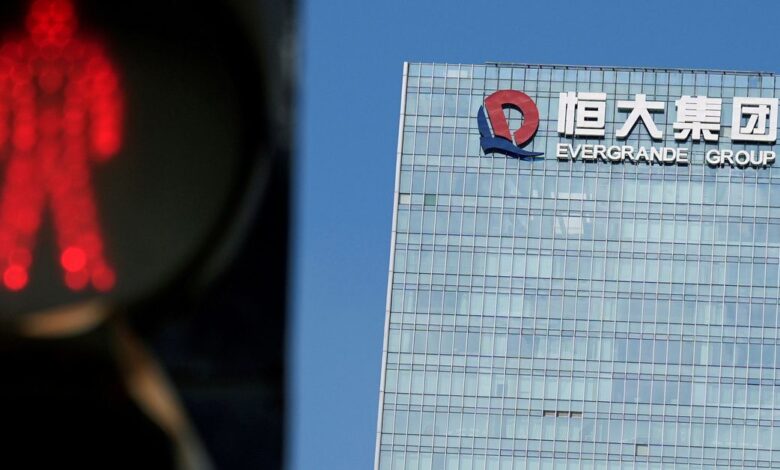As Evergrande default looms, what legal options do offshore creditors have?

A visitors gentle is seen close to the headquarters of China Evergrande Group in Shenzhen, Guangdong province, China September 26, 2021. REUTERS/Aly Music/File Picture
LONDON/HONG KONG, Oct 13 (Reuters) – With China Evergrande Group’s default deadline drawing nearer, offshore bond buyers within the property developer are pondering their authorized choices to safeguard their investments.
Under are some components at play as offshore buyers, with some $20 billion of Evergrande debt excellent, gear as much as take care of the potential fallout from what might change into China’s greatest ever company default:
DO EVERGRANDE’S OFFSHORE BONDS CARRY ANY GUARANTEE FROM ISSUER?
Chinese language authorized guidelines stop mainland-incorporated dad or mum corporations from guaranteeing their subsidiaries’ offshore debt with out going by a registration and approval course of.
To work round this, offshore company bonds, in lots of instances, are issued by Particular Goal Autos (SPVs) and have a so-called keepwell construction.
The best way many market contributors labored across the lack of a assure was by utilizing keepwell deeds – an enterprise to bondholders, and the offshore SPV which points the debt, that the dad or mum will ensure that the SPV maintains a constructive web price and stays solvent.
The keepwell construction emerged in 2012-2013, in keeping with Fitch, which cited knowledge estimating that in 2020 greater than 16%, or practically $100 billion, of excellent offshore bonds issued by Chinese language corporates contained keepwell constructions.
IS THE KEEPWELL STRUCTURE LEGALLY ENFORCEABLE?
Chinese language courts are broadly seen to have broad discretion to refuse to implement a keepwell, based mostly on public curiosity.
“The elemental query in entrance of buyers is whether or not the keepwell settlement is enforceable and what distinction which will make within the restoration course of ought to the group default,” stated Matthew Chow at S&P International Scores.
Take a look at instances for this construction have been few and much between.
Chow factors to the case of Peking College Founder Group Co Ltd, the place court-appointed directors dominated final 12 months that they’d not of the group’s defaulted offshore bonds.
However in a separate case, an offshore bondholder in CEFC Shanghai Worldwide Group Restricted (CEFC), who filed a declare in Hong Kong in opposition to the corporate for breach of the keepwell deed, secured a default judgment in its favour.
This choice was upheld final November on the grounds that enforcement wouldn’t be regulation agency Ashurst says. Nevertheless it notes {that a} choice might have been totally different if proceedings had been contested.
WHAT ARE THE OTHER OPTIONS?
Given how entrenched Evergrande is in China’s financial system, some analysts voiced doubts over how enthusiastic Chinese language courts could be to facilitate a payout to international collectors, probably to the detriment of home ones.
David Billington, a restructuring companion at Cleary Gottlieb Steen & Hamilton LLP, stated collectors may need another choices.
“As an alternative of implementing the keepwell itself, the bondholders might put the offshore issuer firm into liquidation or different insolvency course of,” Billington stated.
This might basically imply the collectors take over the SPV that issued the bonds by a liquidator, who then would pursue the automobile’s claims in opposition to the Chinese language dad or mum firm.
Such a transfer might enhance the optics for the Chinese language court docket, Billington stated.
“As an alternative of giving a judgment requiring a fee on to a bunch of international collectors, the Chinese language court docket would simply be upholding a promise {that a} mainland dad or mum gave to its subsidiary, which it did not carry out on.”
Nonetheless, the character of the issuers and the invisible hand of authorities can show a stumbling block, stated Karl Clowry, restructuring companion at Addleshaw Goddard in London.
“Evergrande is sort of like a quasi-sovereign debt restructuring in that the numerous stakeholders and the authorities are little question dictating what must be executed, though with the sponsor nonetheless in place,” he stated.
“The hand of the federal government and authorities is rarely distant.”
WHAT ARE THE CHANCES OF OFFSHORE BONDHOLDERS MAKING CASH RECOVERY?
Chinese language restructurings are sometimes difficult and never simply standardised, in keeping with S&P. Nonetheless, in relation to dollar-bond defaults, out-of-court restructurings are widespread and permit collectors some leeway to strike a deal totally different to the one agreed with home collectors and on totally different timelines.
Tewoo and tender provide for its 4 U.S.-dollar bonds in December 2019 whereas the agency’s onshore in-court debt restructuring was authorized round a 12 months later.
Even going by an in-court restructuring would not make all the time for comfy studying in relation to money restoration charges – which rely upon a large number of things from asset high quality to fairness possession and complexity of the group construction.
Primarily based on a evaluate of practically 50 defaulters going by in-court restructurings, S&P discovered buyers noticed a median restoration of 23.7%.
“Everyone seems to be watching to see how this performs out,” stated a Hong Kong-based lawyer at a significant western regulation agency. “The results of this might influence the way in which restructurings are executed right here sooner or later.”
Reporting by Karin Strohecker in London and Scott Murdoch in Hong Kong; Further reporting by Tom Westbrook in Singapore and Kirstin Ridley in London; Enhancing by Sumeet Chatterjee and Muralikumar Anantharaman
:





